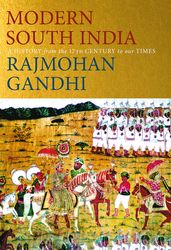The book is meant to be, as the author says in the preface, a continuation of the story of south India from where the doyen K.A. Nilakanta Sastri left off. Sastri ended the story with the fall of Vijayanagara towards the end of the 17th century. Rajmohan Gandhi starts his story around that time. That is an unenviable task. For, it is easy to start a history narration with the building of an empire. It is simply difficult to start with the end of an empire. Any author would be tempted to go back to the empire, and describe how orderly things had been before the post-imperial chaos began—at least to keep the reader interested.
Gandhi has resisted that temptation and yet kept the reader hooked to his story. He tells the tales of the Nayaks of the Tamil country; the formation of a 'national monarchy' under Marthanda Varma in Travancore; the sneaky expansion of European powers; the intense Anglo-French rivalry, much of which is told from the accounts of Ananda Ranga Pillai (wouldn't one love the Pepys of Pondicherry?); and finally, the triumph of British military mercantilism under Stringer Lawrence and Robert Clive. The story then quickly moves on to the Mysore country where greater imperial statesmen, like Cornwallis and the Wellesley brothers, would take on Hyder and Tiger Tipu. It then races grippingly through the rise of nationalism, the surge of the Congress movement, the post-Independence dilemmas, and finally, the hurly-burly of modern electoral politics.
The author tells the story of south India through smaller and sub-stream players, but takes care not to write a boring socio-political narration that is often disguised as subaltern history. Even while talking of the petty merchants, missionaries and mercenaries, he does not allow any digression from the larger political picture being drawn by the governors and generals in the 17th and 18th centuries, and the viceroys and the Congress leaders in the 19th and 20th centuries.
These smaller parts of the large picture often tell different stories to more interested readers. For instance, those who have read the history of the Anglo-Gurkha war will find Colonel Rollo Gillespie, who was killed in the battle of Kalunga on the Nepal border, suppressing the Vellore mutiny in this book. Or how Mornington (Richard Wellesley) dismissed Tipu's views on Napoleon's defeat in the Battle of the Nile, and mobilised against Mysore.
That is the other attraction of the book—the little anecdotes around the major and minor characters who shaped the history of the region. These anecdotes impart life into those whom we otherwise read about as mere political or military personages. The book, that way, is not the history of south India, but the history of the men and women who shaped it.
MODERN SOUTH INDIA: A HISTORY FROM THE 17TH CENTURY TO OUR TIMES
Author: Rajmohan Gandhi
Publisher: Aleph
Pages: 508
Price: Rs799



